Welcome
....to JusticeGhana Group

JusticeGhana is a Non-Governmental [and-not-for- profit] Organization (NGO) with a strong belief in Justice, Security and Progress....” More Details
African biodiversity under threat
- Details
- Category: The World
- Created on Tuesday, 29 July 2014 00:00
- Hits: 4514
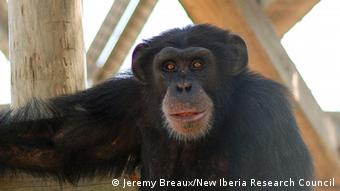 African biodiversity under threat
African biodiversity under threat
Researchers meeting in Cameroon have warned that Africa could lose up to 30 percent of its animal and plant species by the end of the century because of global warming, population growth and unregulated development.
It is mid-afternoon in Lom Pangar in Eastern Cameroon. People are busy working, digging holes and cleaning up. Some are cutting down trees in preparation for the construction of a new dam that could generate up to 30 megawatts of hydroelectric power. Nformi Johnson works for one of the contractors.
"We are entering the forest to do a survey of the area before Chinese engineers come in and destroy the trees. They will build company offices and hospitals after destroying the trees."
The World Bank is contributing $132 million (98 million euros) in funding for this project.
African forests at risk
A group of researchers from 20 African, American and European universities, who met recently in the Cameroonian capital Yaounde, said such hydroelectric dam projects, along with industrialization and the plantation of cash crops, have turned into a real threat to the environment. It is the vast natural expanses of forest that suffer.
Sub-Saharan countries are losing forest faster than anyhwere else on earth, the researchers said. Trees are being cut down to build houses, to make ways for huge hydroelectric dams and to meet the demand for timber from China, Europe and the US.
Thomas Smith from the Center for Tropical Research at the University of California told DW that the felling of trees reduces the density of wildlife, destroys its habitats, and causes temperatures to rise.
"With a 1.5 degree rise in global temperature, Africa may lose 30 percent of its animals and plants," said Smith.
He also said that a rise of 3 degrees Celsius (5.4 degrees Fahrenheit) in global temperatures could mean a loss of 40 percent of all mammal species in Africa by the end of the century.
Disappearing species
One species that researchers say is disappearing is the African chimpanzee. Mary Katherine Gonder from the Department of Biology at Drexel University in Philadelphia in the United States, told DW the primate's forest habitat was falling victim to the loggers. Chimpanzees continue to be hunted and sold as food. She predicted dire consequences over the next 20 years.
"Their habitat will change fundamentally and they will no longer be around," Gonder said.
South African researcher Teddie Eddie believes the process of replacing the disappearing species could take a very, very long time.
"For certain species in Central Africa, their replacement time might be at least 25 million years."
Such warnings about disappearing species comes as African countries are investing in energy and extractive industries in a bid to develop their economies and eradicate poverty.
Green economies as an answer
The United Nations 2013 Development Report says a majority of the population in Africa lives below the poverty threshold of $1 (74 euro cents)
Smith said development and conservation in Africa need not be mutually exclusive.
"With these enormous challenges we need to develop green economies. We need to make sure that the development we do is sustainable,” Smith said.
He said his university is working with third parties to develop new strategies for the creation of green jobs which can preserve forests and at the same time produce commercially viable crops for food.
"So we need to be thinking about how to preserve the natural processes and at the same time provide for the economic needs of the country," he said.
The Congo Basin, which covers a large part of Cameroon, is one of the regions hardest hit by climate change. Tens of millions of people depend on the Congo forest for their livelihood.
Date 25.07.2014
Author Moki Kindzeka in Yaounde / ael
Editor Mark Caldwell
Source: Deutsche Welle
Germany commemorates Hitler assassination bid
- Details
- Category: DateLines
- Created on Sunday, 20 July 2014 00:00
- Hits: 3583
Germany commemorates Hitler assassination bid
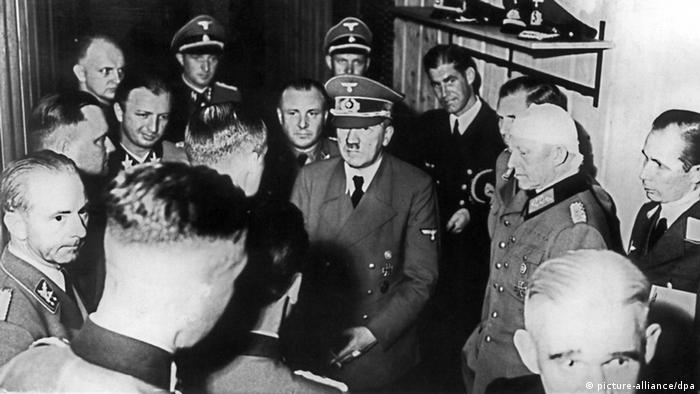
Ceremonies are being held in Germany for the 70th anniversary of a failed attempt to assassinate Adolf Hitler. Some 200 people were killed for their involvement in the plot.
Commemorations of the failed assassination attempt on Nazi leader Adolf Hitler on July 20, 1944, got underway in Germany on Sunday with a church service in the Berlin Cathedral.
Speaking at the televised service, the president of the council of the Evangelical Church in Germany (EKD), Nikolaus Schneider, said it was important to honor the efforts to resist Hitler made by a group led by Claus Schenk Graf von Stauffenberg.
The women and men involved in the plot had to wait a long time in Germany before they were no longer considered traitors, but fighters for justice, Schneider said.
Schneider also said that the resistance showed that not all Germans had watched on passively or been enthusiastic followers of Hitler in the Nazi era.
Conspirators 'set standards'
Former German President Richard von Weizsäcker, who personally met Stauffenberg and knew of the plot to kill Hitler, said that those who tried to carry out the plot "remained models."
The conspirators had "set standards with their actions and their death," he wrote in an article for the newspaper "Bild am Sonntag."
The men had decided to go through with the plot despite knowing that the war was lost, Weizsäcker wrote. By so doing, they had acted "for those that should have intervened," taking "blame upon themselves, our blame for the sins of omission that we were entangled in."
The German government is also to hold a commemoration ceremony, where current President Joachim Gauck will deliver the official speech. The ceremony will be held in the building complex in Berlin known as the Benderblock, where Stauffenberg and his fellow plotters were executed on the night after the failed attempt.
Survival miracle
On 20th July 1944, a group of Wehrmacht officers led by Stauffenberg tried to blow up Hitler in one of his headquarters, known as the "Wolfsschanze" (Wolf's Lair), situated in what is now Poland.
Protected by an oak table, Hitler survived the attempt slightly wounded, though four other people were killed.
Stauffenberg and three other conspirators were arrested and executed a day later. Two hundred other people suspected of involvement in the plot were also executed or murdered in concentration camps.
tj/hc (AP, KNA)
Source: Deutsche Welle
Europe's boss: Merkel turns 60
- Details
- Category: DateLines
- Created on Wednesday, 16 July 2014 00:00
- Hits: 3906
Europe's boss: Merkel turns 60
Angela Merkel has presided over a time of great influence and economic success. Germany has assumed a more prominent role in the world - and its unassuming chancellor has become a political heavyweight.
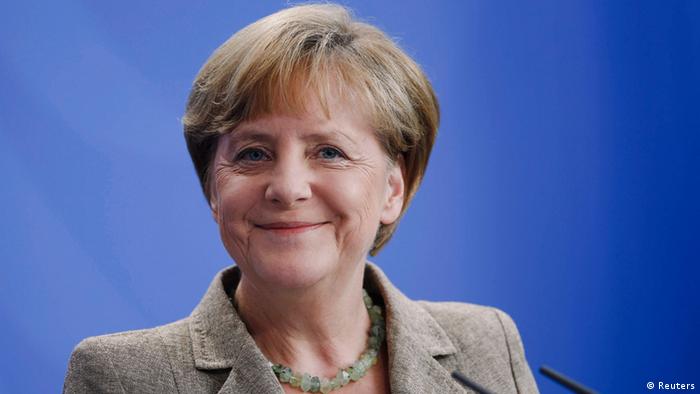
Angela Merkel, leader of Europe? Just a few years ago, this didn't seem likely. On the contrary, in the first few years of her nearly nine-year tenure as chancellor, the question was often asked whether a woman from the former East Germany was suited for the post.
But German Hollywood director Roland Emmerich was apparently convinced of her abilities quite early on. In his 2009 blockbuster "2012," humanity has to be saved from annihilation in Noah's Ark-like ships. The Europe ship is helmed by a Merkel-like chancellor who speaks in the name of the other states. Yet at the time the film was made, it wasn't even clear Merkel would be returned to power in the 2009 election.
It turned out that Emmerich's assessment was correct: Merkel became one of the leading voices in Europe. In the May 28 issue of "Forbes" magazine, she was named the world's most powerful woman - for the fourth year in a row. "Time" magazine has named her one of the 100 most influential people in the world for the sixth time.
Merkel's promise
Of course, this would not have been possible without national success. She enjoys a good reputation in Germany and tops the popularity scale for politicians published by news magazine "Der Spiegel."
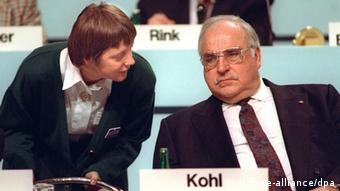 Young people, and not just voters or members of her party, the Christian Democratic Union, see her as a role model. Reasons given for this include Merkel's authenticity: she hasn't changed much despite having gained power.
Young people, and not just voters or members of her party, the Christian Democratic Union, see her as a role model. Reasons given for this include Merkel's authenticity: she hasn't changed much despite having gained power.
She is what she is, at times aloof or displaying silent, pursed-lip disapproval. She is rather unemotional and ever-focused on the task at hand. She is no show-off.
Outwardly as well, she radiates stability: she has only very cautiously made changes to her clothing and hair, which she famously used to cut herself. She offered herself to Germans as a dependable pilot through crisis years. Her key message was: After the crisis, things will be even better for Germany than before.
Her plan has worked out: Unemployment numbers are down and Germany has continued to grow economically. Merkel is now in her third term as chancellor - an undisputed leader of her party, which she has molded over the years according to her preferences.
Some cringe at the question of who could fill her shoes, since there is no obvious answer. Perhaps it could be the current defense minister, Ursula von der Leyen, although she is controversial even within her own party.
Simply put, governance in Germany has become synonymous with Angela Merkel.
From problem child to model student
Step by step, Merkel - who holds a degree in physics - has increased her power, in Germany and beyond. Once Germany had overcome the worst part of the crisis, Merkel took to the European stage. She modified her message to include all of Europe. She zeroed in in a void within the European Union: a lack of politicians who wanted to, or could, take the reins.
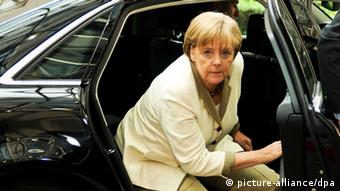 Of course, she had to take some hits along the way. But, as in Germany, her opponents disappeared over time for different reasons. With German economic might once more behind her, Merkel's voice gained weight in Europe, even though as the largest contributor to the EU budget, Germany's voice was already powerful.
Of course, she had to take some hits along the way. But, as in Germany, her opponents disappeared over time for different reasons. With German economic might once more behind her, Merkel's voice gained weight in Europe, even though as the largest contributor to the EU budget, Germany's voice was already powerful.
Over the course of the crisis, the gap between Europe's largest economic power and the other national economies increased once again. Germany - which at the turn of the millennium was considered a "problem economy" - has become the continent's model student.
And it feels this give it the right to tell others what to do. In their dealings with the eurozone crisis, Merkel and Finance Minister Wolfgang Schäuble have been guided by their conviction that European bailout funds can only go to finance-stricken countries if these agree to large-scale reforms.
This approach has been recently praised by Hillary Clinton, the likely front-runner in the 2016 US presidential election. When asked on a German talk show why she thought Merkel has become so powerful, Clinton replied by saying Merkel had successfully led Europe through the financial and debt crisis. A number of other politicians around the world see things the same way.
New responsibilities
Germany is striving for a balanced budget, even as southern European countries are still inturmoil from the eurozone crisis. But in the course of the Ukraine crisis and the NSA scandal, including the most recent spying affair, Germany has gained a yet more prominent role on the international stage.
Supported by German Foreign Minister Frank-Walter Steinmeier, Merkel mediated between Moscow, Kyiv, Berlin, Brussels and Washington. This prevented a large-scale escalation of the Ukraine crisis and softened the economic consequences through a level-headed approach to sanctions. Just like in the eurozone crisis, Merkel took the lead to resolve the situation.
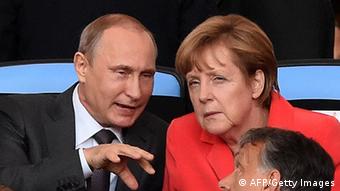 Now, Germany has been the only country to set up an inquiry to investigate the scale of espionage by intelligence agencies. The German government recently expelled the top CIA representative in Germany. Merkel is walking the fine like between attracting America's attention to German issues and maintaining good transatlantic relations.
Now, Germany has been the only country to set up an inquiry to investigate the scale of espionage by intelligence agencies. The German government recently expelled the top CIA representative in Germany. Merkel is walking the fine like between attracting America's attention to German issues and maintaining good transatlantic relations.
Future plans under wraps
For some time now, a rumor has been going around in Berlin's political circles that Merkel would like to find a new role when her present term in office ends in 2017.
One of the options mentioned is UN Secretary-General. Merkel has denied this, clearly not wanting to discuss such possibilities for political and strategic reasons. But it is an imaginable scenario - and the UN is allegedly keen to find a leader who could push through necessary reforms.
At this stage, Merkel is silent about her plans for the seventh decade of her life. Perhaps Emmerich's latest film - the sequel to the science fiction hit "Independence Day" - will provide an answer. The movie doesn't deal with national, European or international problems, but with intergalactic ones.
Date 16.07.2014
Author Kay-Alexander Scholz / sad, ew
Editor Simon Bone
Source: Deutsche Welle
'Merkel might come back as a climate leader'
- Details
- Category: DateLines
- Created on Sunday, 20 July 2014 00:00
- Hits: 4798
iv class="title-blue">environment
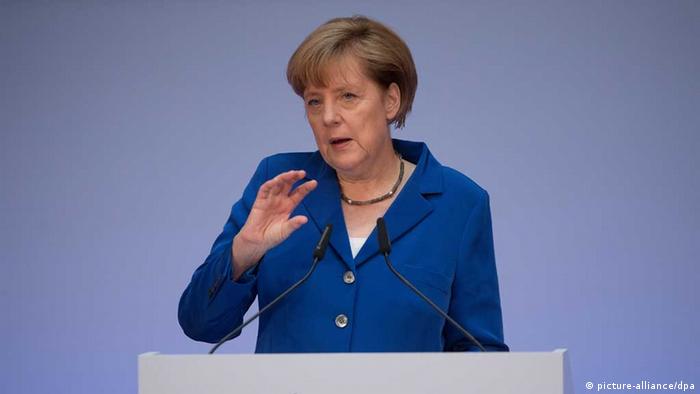 'Merkel might come back as a climate leader'
'Merkel might come back as a climate leader'
This week, Germany hosted the fifth Petersberg Climate Dialogue in preparation for the Climate Change Conference in Peru at the end of this year. Christoph Bals from Germanwatch gives his verdict on how the talks went.
DW: What were the major outcomes of the Petersberg Climate Dialogue in Berlin?
Christoph Bals: Big players for climate policy, and the EU too, are willing to get an ambitious deal next year in Paris for a new climate deal which is so necessary. China has, for the first time, announced a commitment about the peak year of China's emission. China is the biggest emitter by far in the world and soon China will have twice as much emissions as the US, the second biggest emitter. And this announcement, that they will relatively soon stop increasing their emissions, would be a turning point for the international climate debate.
How do you see Germany's current position in the climate negotiations?
Chancellor Merkel showed for the first time that she might come back as a climate leader on the international stage. She announced not only that in the next G7 summit - which is hosted by Germany - that climate change will be one of the key issues on the table. She also announced there will be an extra outreach event of the G7, where other important players will be invited by her personally, to discuss potential outcomes ahead of Paris. So, for the first time she has shown that she might be willing to again play the leading role in the international climate debate.
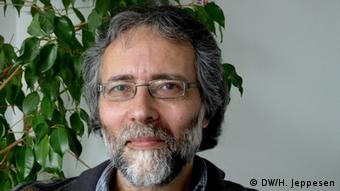 Will European leaders now be taking more of a lead in climate change negotiations?
Will European leaders now be taking more of a lead in climate change negotiations?
We are in a very interesting and critical situation in Europe. We have three debates which are crucial: climate energy policy, energy security policy, and recovery policy for Europe.
In all three policy fields renewable energy and energy efficiency are at the core of a solution. And if this could be combined then we could get a really new dynamic from the European leaders. But at the moment it is totally uncertain as to whether we will really see this.
Germany has donated 750 million euros to the UN Green Climate Fund to help developing countries to manage climate change. Is this enough? Are other countries likely to follow?
It's a first and promising step. The German pledge only makes sense if we look at it as one important step. We now need also very good proposals on how the money should be spent and, on the other hand, we also need the willingness of other actors. We need reform of the big development banks so that they support climate transformation in the direction of energy efficiency, renewable energy and that they phase out their support of coal. So all this must come together, and this donation was one important step in the right direction.
When and how will this UN Green Climate Fund be distributed?
This is not really clear. But it was clear that half of the money should be spent for adaptation, more or less half the money for mitigation, this means for climate protection. It was also clear that a big part of the money should go the poorest countries in the world and not to those countries who can already afford to finance their energy transformation or resilience strategy in their own country. So there are some general indications how the money should be used, but now every country can bring forward plans. Then it will be decided who gets the money.
How does the responsibilty of mitigating climate change between industrialized and emerging economies differ?
I think equity is a crucial precondition for an ambitious deal in Paris. The [UNFCCC] convention has clear criteria for this: responsibility and capability. But the world has changed dramatically since 1990. Today, more than half of the ten highest emitting countries per capita are so called developing countries, usually oil countries. We also don't live any longer in a G7 world, we live in a G20 world today. This means that the old dichotomy between industrialized and developing countries is no longer valid. "We have to acknowledge that the world has changed," declared the Chinese minister some weeks ago in Bonn.
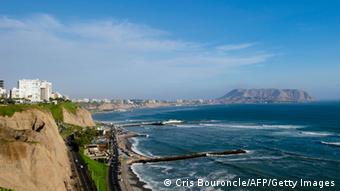 At the same time it is important that we move out of the old "burden sharing" paradigm, [where people say] "climate protection is a burden, and others should carry it, not my country." This is not the way to create dynamic development. We need a combination of burden sharing, risk sharing and benefit sharing. Benefit sharing is probably the way to create most additional dynamics. What kind of co-operation can support countries with little capacity to move towards a resilient low carbon future?
At the same time it is important that we move out of the old "burden sharing" paradigm, [where people say] "climate protection is a burden, and others should carry it, not my country." This is not the way to create dynamic development. We need a combination of burden sharing, risk sharing and benefit sharing. Benefit sharing is probably the way to create most additional dynamics. What kind of co-operation can support countries with little capacity to move towards a resilient low carbon future?
Are there high hopes for the UN climate conference to be held in Peru in December?
The role of the Lima conference will be that all important elements for a deal in Paris should be on the table - still as options for a deal, but that we at least have a negotiation text and a platform. The next 12 months can then be used to work out the details of the deal in Paris. So, at the moment, it is crucial as to whether we get this in Lima or not. It is technically extremely important, but the decisions will only come one year later.
Are countries on track to reach a new global agreement on climate change in Paris by the end of 2015? What needs to happen?
There is new momentum definitely building up at the moment. Lots has to be done for us to really get success, but there's more optimism around now than a few weeks ago.
Christoph Bals is the policy director at the non-governmental organization Germanwatch in Bonn. He is an expert in climate policy and co-author of the paper "The End of EU Climate Leadership" published in October 2013.
Date 17.07.2014
Author Interview: Charlotta Lomas
Editor André Leslie
Source: Deutsche Welle
Ditching Washington to do business
- Details
- Category: The World
- Created on Sunday, 13 July 2014 00:00
- Hits: 5109
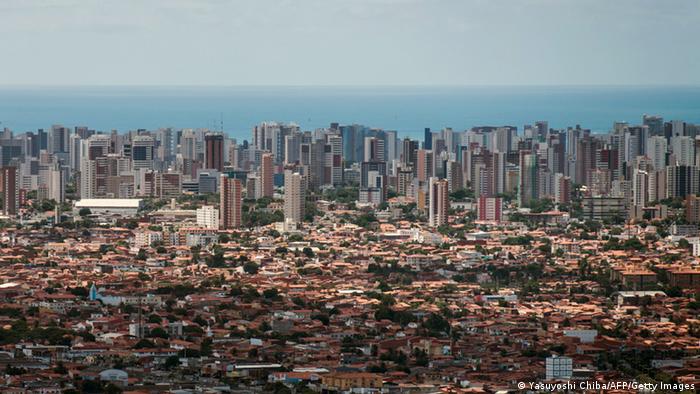 Ditching Washington to do business
Ditching Washington to do business
Despite being knocked out of the World Cup, Brazil is still in the spotlight. The country is about to host the BRICS summit, where it wants to change global monetary policy with Russia, India, China, and South Africa.
A new development bank and an alternative monetary fund are the most important projects expected to emerge from the three-day BRICS meeting in Fortaleza und Brasilia next week (14 - 16.07.2014). All five heads of state from the economic union of emerging powers are expected to participate.
"The establishment of these financial institutions shows that the BRICS countries want to exert greater influence, in a constructive way," said deputy secretary at the Brazilian Foreign Ministry, Jose Alfredo Graca Lima. "They reflect the World Bank and the International Monetary Fund."
The new development bank, with its capital stock of $50 billion (35 billion euros) and a financing capacity of $100 billion, will fund infrastructure projects in the so-called BRICS countries and in other developing countries.
The new monetary fund will help countries struggling with balance of payments. It's been speculated in the Brazilian media that Argentina may be the first country to ask the new institution for a bailout loan. President Cristina Kirchner has already confirmed she'll be attending the summit of BRICS leaders on July 16 in Brasilia.
China pays the most
There are still many unanswered questions about how the new financial bodies will work. Neither the seat of the institutions, nor the name, or criteria by which loans are granted, have yet been revealed. So far, only the financial volume has been fixed.
According to the Brazilian Foreign Ministry, the fund has $100 billion at its disposal: China's deposit amounts to $41 billion, while Brazil, India, and Russia will contribute $18 billion each, followed by South Africa's $5 billion.
The launch of the fund is being seen in Brazil and elsewhere as a response to the lagging reforms in the International Monetary Fund (IMF). During the spring meeting of the World Bank and IMF in April, the US Congress vetoed a reform package adopted by the IMF in 2010 that called for changing voting rights to the benefit of emerging and developing countries by six percent.
Looking for a common identity
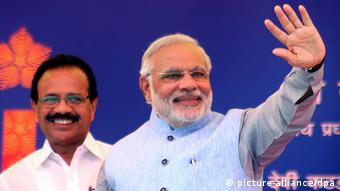 "Everyone wants more flexibility," said economist Lia Valls Pereira of Brazilian think tank Instituto Getulio Vargas. "The BRICS states are showing the USA that changes are possible."
"Everyone wants more flexibility," said economist Lia Valls Pereira of Brazilian think tank Instituto Getulio Vargas. "The BRICS states are showing the USA that changes are possible."
The fund and the development bank could also help build a common identity among the BRICS nations. Deputy secretary Lima admits that such steps are still in their infancy.
"It is easier to say what the BRICS are no more than a sum of their parts," Lima said. "They are not an international organization, not a tax union, and not a free-trade agrea. They are more like a cooperation mechanism that has proved useful."
So far, cooperation has concentrated on trade wtih China. Brazil's exports to China totalled about $1 billion in 2000 and grew to $46 billion in 2013. China replaced the United States as Brazil's largest trading partner in 2012. Brazilian exports to Russia, South Africa, and India, on the other hand, have increased more modestly. According to the Brazilian Foreign Trade Ministry, exports to India were worth $1.3 billion in 2013, exports to Russia reached nearly $3 billion and Brazil exported $1.8 billion worth of goods to South Africa.
A historic summit?
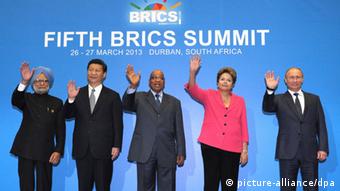 BRICS states are also politically united in their desire to see changes to the United States' hegemonial trade power. The foundation of these financial institutions, loosely modelled on the Bretton Woods conference that regulated international monetary and financial transactions after World War Two, could make the summit in Fortaleza a historic event.
BRICS states are also politically united in their desire to see changes to the United States' hegemonial trade power. The foundation of these financial institutions, loosely modelled on the Bretton Woods conference that regulated international monetary and financial transactions after World War Two, could make the summit in Fortaleza a historic event.
For Brazil, the summit represents the second international event to take place in the country after the World Cup. With leaders from China, India, and Russia visiting Brazil, the four-day summit will be of major importance to the BRICS states. Whether it is also important to the rest of the world is unclear. Unlike summits of the G-8, where political hot-button issues often overshadow the established agenda, Russia and China as well as India, South Africa, and Brazil agree there are topics the BRICS organization should not get involved in.
Brazilian Foreign Minister Figueiredo Machado made that clear when he said, "BRICS and Ukraine - those are topics that should not be mixed together."
Date 12.07.2014
Author Astrid Prange / nm
Editor Ben Knight
Source: Deutsche Welle


